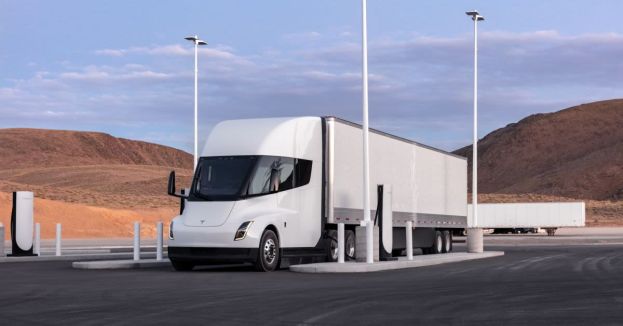The study was commissioned by the Clean Freight Coalition, an organization comprising several trucking industry groups.
The study suggests that trucking fleets and charging station operators will need to invest approximately $620 billion into new charging infrastructure. This figure encompasses the cost of chargers, site infrastructure, and utility service. Furthermore, trucking operators will have to invest in on-site charging stations, which the study estimates will total $496 billion. For heavy-duty trucks, such as semi-trucks, chargers will cost $145,000 per vehicle, while medium-duty trucks will cost $54,000 per vehicle.
Earlier this month, the Environmental Protection Agency (EPA) released its final tailpipe emission standards. Although these rules do not apply to heavy-duty vehicles, the EPA estimates that automakers will need to ensure that between 20% and 32% of the medium-duty vehicles they manufacture are electric to comply with the standards. This includes vehicles like the popular Ford F-150 Lightning.
WATCH: NICOLE WALLACE AND THE END OF DEMOCRACY![]()
The Roland Berger study also estimates that utilities will need to invest approximately $370 billion on grid upgrades to accommodate the increased electricity demand for electric truck charging. According to the study, this figure is equivalent to the total investment made on the entire distribution grid over the past 15 years.
YIKES! IS MARJORIE TAYLOR GREENE LOSING HER 'GRIP' IN POWER STRUGGLE?![]()
March 29, 2024
Moreover, local on-route charging networks will necessitate an investment of $69 billion. To support long-haul trucking, a sufficiently dense highway charging network will require an additional investment of $57 billion.
WATCH: FETTERMAN CONFRONTED BY A PRO-HAMAS ACTIVIST![]()
The study advises, "Given the significant (and in some cases, prohibitive) investments required for electrification, there may be greater value in being open to alternative decarbonization routes, as opposed to being prescriptive on technology."
TESLA IN TURMOIL: MUSK OUSTS TOP EXECS AND PREPARES FOR MASSIVE LAYOFFS, WHAT'S HAPPENING?![]()
The study also cautions that without adequate government and regulatory support, freight costs are likely to rise, and these costs will inevitably be passed onto the consumer.
Even if the funding for all this infrastructure could be found, it remains uncertain whether the U.S. could generate enough electricity to power the charging stations.
PROFESSIONAL "PROTEST CONSULTANT" CAUGHT ON VIDEO STIRRING UP CHAOS AT COLUMBIA UNIVERSITY![]()
A 2022 study by the American Research Institute (ATRI) estimated that electrification of all freight vehicles, including long-haul trucks, would require 14% of the current electricity generation in the United States. If all vehicles are added to that, such as passenger cars, the figure jumps to 40%.
PUMP AND DUMP: VIRAL "BOCA BASH" VIDEO SPARKS MAJOR INVESTIGATION![]()
The study also highlighted other issues with such a transition, including the supply chains for the EV production lines and the charging infrastructure costs.
In anticipation of California's drive to electrify all aspects of the transportation sector, the ATRI conducted a study in December on the cost to California's trucking industry to go full electric. The study concluded that, considering the costs of the trucks, the required infrastructure, and the state's high electricity rates, consumers will ultimately pay significantly more for products to cover the expense.
DID KRISTI NOEM'S DISTURBING ACTIONS RUIN HER SHOT AT VP?![]()
According to the American Trucking Association, trucks transport nearly 73% of the nation's freight by weight. If the trucking industry is forced to bear a significant portion of the costs to electrify their fleets, prices for a wide range of goods will be impacted by the added costs of shipping.








 Discover alternative ideas that will make you think
Discover alternative ideas that will make you think Engage in mind bending debate
Engage in mind bending debate Earn points, rise in rank, have fun
Earn points, rise in rank, have fun


